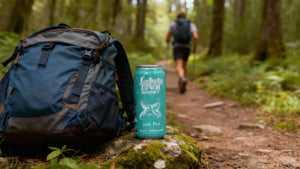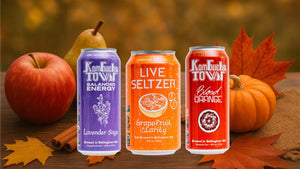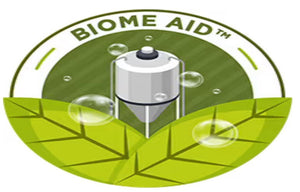7 Minutes with CEO Chris McCoy
In mid-October, Kombucha Town CEO Chris McCoy had the pleasure to be featured on Mind The Gap, a podcast by Troy Niehaus and Aaron Marberg of AllianceBernstein, a global investment management and research firm. Troy & Aaron speak with Chris about how he built Kombucha Town from the ground up, the company's move to a community-owned business model — and how Kombucha Town is staying ahead during a global pandemic.
A transcription of the discussion is included below.
Aaron: Good morning, good afternoon, good evening everyone. I'm Aaron Marburg, and welcome to Episode 9 of Mind The Gap, where we spend 7 minutes interviewing brilliant minds to fill the gap in our own intellectual shortcomings. Our research teams at Bernstein have been talking about the trend towards healthier eating, and today we're going to be speaking with an entrepreneur who lives well within that space. Now, this is going to be great, informative conversation for my co-host because he thoroughly believes potato chips are part of the vegetable food category. So let's go ahead and bring him in.
Troy: Thank you everyone. Hi, I'm Troy Niehaus, and as most of you know, kombucha is filled with powerful antioxidants and probiotics that are just so important for our health. So, I'm wondering if there's anything that could be added to help stave off the effects of you, Aaron.
Aaron: I don't think it's that strong.
Troy: It's gotta be really powerful to do that. But we'll just have to ask our guest here, Chris McCoy from Kombucha Town. He brews energizing and refreshing kombucha and Live Seltzer drinks that I'm so excited to hear more about. We've got a lot to discuss, Aaron, so let's start the timer and dig in.
Aaron: All right. Perfect. Well, Chris, first of all, thank you for joining us today. Tell us about Kombucha Town. How did you get started?
Chris: Hey, well, thank you both for having me here. It's been a pleasure so far, just getting to this point. I founded Kombucha Town back in 2011, so, as far as the kombucha industry goes, we've actually been in the game for awhile. I originally started the company because, at the time, my mother had some cognitive issues and my father had passed away several years before that. I was trying to work full-time, and I was in the green building space, actually certified sustainable building advisor, and I could not work full-time as well as manage her care.
So we decided kind of collectively as a family that starting a business would give us that flexibility to be able to be able to both care for her and involve her in the business quite a bit.
You can see that picture right there is us back in, I think, 2013. She helped wash bottles and just hang out on the shop and do all that. She's been in an assisted living situation for several years now, but really ultimately it was to have that flexibility and then to create an opportunity to be able to support her in the long run that was kind of the initial thing.
You know, I, I grew up in Southwest Colorado and so it is a very beautiful rural place and then moved to Bellingham with my family later in life. That's something that has really instilled a strong sense of environmentalism in me. And I've experienced some sickness in my family that also made me very, very focused on health and wellness.
And so, you know, kombucha was becoming more and more of a trend back when I was in college at Western Washington University, studying economics and environmental studies. And I could see the indicators of an emerging industry there with the health elements, the probiotics, the antioxidants, the low-sugar, low-cal... I was like, this is going to be a good opportunity. And lo and behold, it's been essentially like having a tiger by the tail the whole time.
It's been a great experience. We've done some innovation in the industry. It's been really rewarding and also incredibly difficult. I'm a sole founder, and I founded it without a career. So I kind of joke that I've done things a little backwards. I was just delivering sandwiches on my bike for Jimmy John's before I started a business, so it's definitely been a bit of the "learn as you go method," but I wouldn't have it any other way. It's been fantastic and I've got to work with wonderful people like yourselves.
So yea, I'm very excited. We're actually entering our 10th year of business now, just last month was our 9th anniversary. So yeah, it's been a great path
Aaron: Go Vikings, by the way!
Chris: Yeah, exactly. Alma mater Western, right?
Troy: Aaron, I was saying, when he, when he refers to the wonderful people, he's gotten to know, you know what he's talking about, right?
Aaron: Yeah. Well, yeah, by the way, sticking to the good-old Vikings theme. We do know that Western spits out some really brilliant people. Well, speaking of brilliant people, where do you see the company at, Chris, in a few years? What's your plan? How do you see the company growing? What are you looking for right now?
Chris: You know, the industry has been proliferating into the mainstream. I think it's definitely gone from early to super mainstream. So there's a lot of room under the curve, but at the same time, there's a lot bigger entities that are vying for those dollars. And so for me, really, innovation is the way to disrupt my way out of that potential stagnation of the industry.
Live Seltzer is a big piece of that. We're the first probiotic seltzer water product on the market. That's something that we're just rolling out. It's, you know, it's been kind of delayed a bit because of COVID-19. We were supposed to launch it at Expo West in early this year, which was canceled and rescheduled for next May.
So, you know, I find my personal skill set and my passion is around innovation, networking, and just having a strong vision to create healthy alternatives, which eventually will be mainstream for people, specifically in the beverage space because that's my lane.
Our kombucha brand actually performs very well in that industry, and we're actually up 27% this year in retail. The industry average is about 17%. So, that's something that we've done really well in, but all the food service accounts like the college campuses and the stadiums - they've shut down. So we took a big hit from that. So it's been a mixed bag.
Ideally, I think the best way for us to really proliferate is to partner with a firm or another brand, or an angel or venture capital firm that's got the resources to really scale it to be able to compete on a national scale. Because, you know, as a sole founder doing it kind of the scrappy brick-and-mortar way... the industry is too expensive to do it that way now.
So I'd like to, you know, if I can keep control, but at least find a value-aligned partner that can then help really scale it and bring new products to market as well.
Troy: Very good.
Aaron: Let's talk about that a little bit. I mean, you mentioned the seltzer right? Some innovation there... new product line helped you see some growth. You talked a bit about raising capital and having the right partner, but let me just ask you about... right now you're in the midst of a raise of capital as a B-Corp. Right? Talk to us about that. I'd love to hear more about it.
Chris: I was kind-of on the campaign trail to do a Series A, along with the product launch. All that's been sort of disrupted, so now we actually pivoted towards the equity crowdfunding model, which is the SEC designation CF, which allows you to actually raise money from non-accredited investors. We chose Start Engine as the platform. There's a few really good ones. They're probably the fastest growing right now. So that has been a method that allows us to market to anybody.
The minimum investment amount is $250, and we've got some fairly attractive terms. It's definitely not a cure or quick scheme or anything like that, but it enables us to open up to a much broader, a more diverse and certainly inclusive kind of investment versus what I have seen in a lot of the VCs or private equity, is really just kind of the concentration of wealth in a lot of ways.
So, even in the way that we raise money, we're trying to be disruptive and kind of push the envelope of how can we continue to build business that's more of a conscious capitalism method. Even a part of our campaign, actually, every level has trees that will be planted by One Tree Planted, a partner organization, to help restore salmon habitat in the Pacific Northwest.
So, we're baking in a lot of those extra values to it. It's definitely a more difficult way to raise money, but to me it's really exciting and helps kind of spread the wealth as it were.
Troy: It makes sense. You talked about the the Live Seltzer probiotic product. We're going to get buzzed here in a second - Aaron, I can see you're waiting here, but I wanted to make sure we got this other question because it's a product that's unique. And so if you can talk a little bit more about that product, which sounds very interesting. Because there's a ton of, at least, alcoholic seltzers that are on the market that some of my older kids love, and I enjoy on occasion. But I'd like to understand the non-alcoholic kind. You got any others that are coming out in the future that you want to surprise anyone with, or any ideas?
Chris: Yeah, so I'm glad you asked and thanks for giving me a little more time to explain. I personally just started drinking a lot of seltzer water. You know, there's been this big exodus of a lot of soda drinkers going from anything sugar related. It's just plaguing our society with obesity and diabetes, things like that.
You know, I thought kombucha would be the natural next step for those consumers, but really they're just abandoning sugar altogether. With that, I'd see all the [seltzer] products on the market, and it's literally just devoid of nutritional value whatsoever. So there's no real benefit other than avoiding things that are bad for you. So, why not add real value to that? It was as simple as blending our raw cultures and developing a bit of a process for that, just so that it would be something that couldn't be easily replicated and somewhat proprietary.
We ended up with a product that's zero sugar, and a few all-natural ingredients. And it's got a really delicious, refreshing palette to it. With that, rolling up my sleeves about a year ago to just try it out, I came out with something I really liked. And now we're looking at going to market with it.
We've already gotten a couple of pretty high-profile chain authorizations with Whole Foods and Aldi coming online here on the west coast early next year. We're excited. I've talked to some big buyers like Walgreens, CVS, 7-Eleven, some of these big chains that could be big national deals, and they're all very interested.
Aaron: Yeah, that's excellent. I'll look forward to giving that a try, as soon as it rolls out. Congratulations!
Chris: It's out! We have samples ready. You know, for anybody that's either interested in investing or just wants to get to know the product, go to the Start Engine website for the campaign, it's just www.startengine.com/kombuchatown, and there's tons of information to learn about the products, the brand, and our story.
Troy: That's awesome, Chris. Well, we've gone into overtime, but I'm really glad that we were able to get an answer from that last question. So, Chris it has been a pleasure. I really appreciate it. Aaron, anything to add?
Aaron: No, just appreciate it, Chris. Glad you could join us. Everybody check it out and try the products and, yeah, check out the raise of the B Corp. That'd be great.
Chris: Well, thanks everybody.
Aaron: Hey, absolutely. Chris, we'll talk to you soon. Take care. See ya.
Aaron and Troy continue discussion Kombucha Town's path, entrepreneurship and Bernstein's investment strategies. The original post can be found here.




